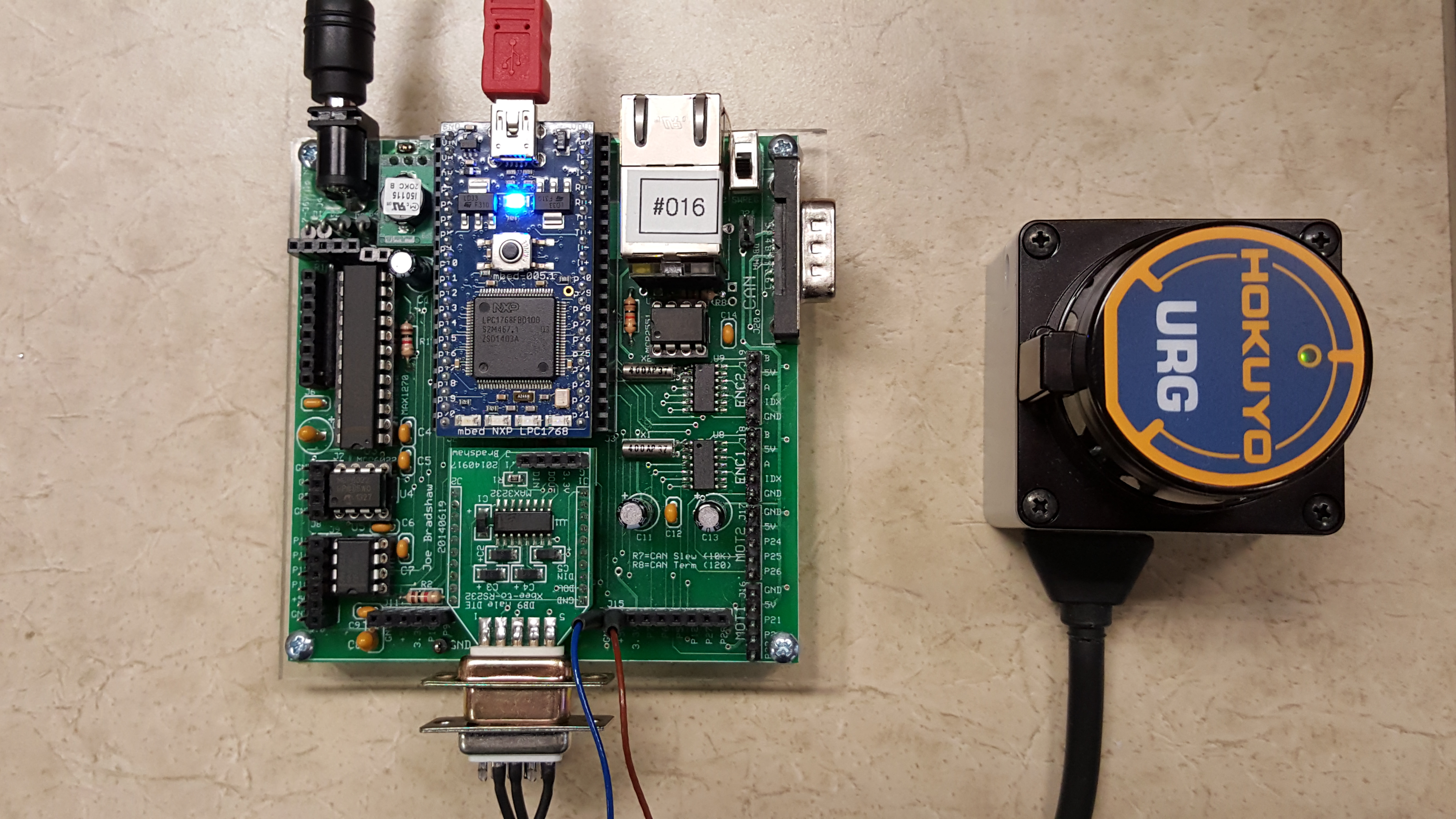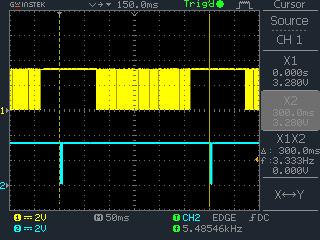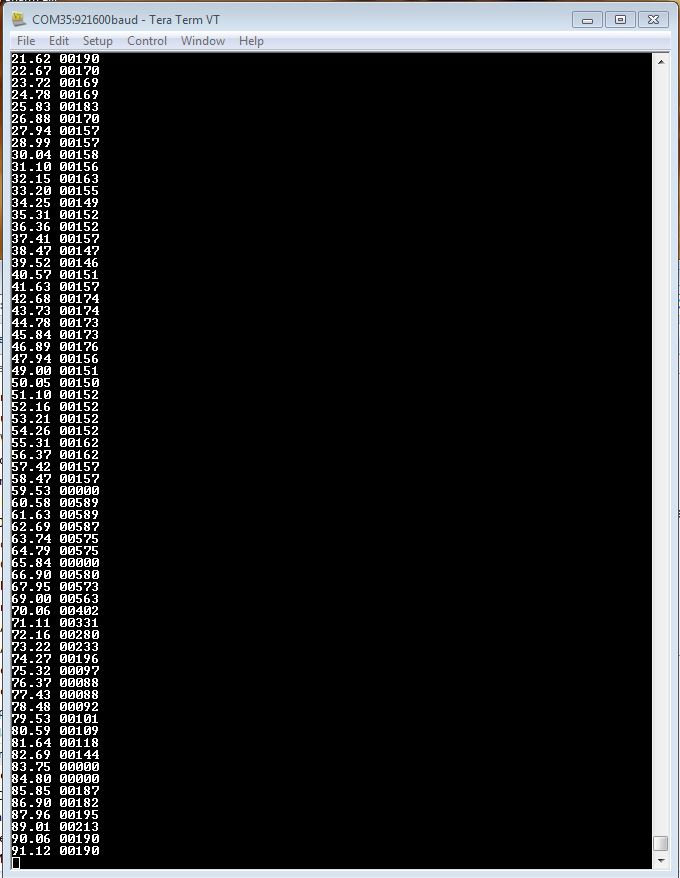Test program for using the Hokuyo URG-04LX LIDAR with the mbed.
Hokuyo Library
This is an example of using the Hokuyo library for the Hokuyo URG-04LX 2 dimensional LIDAR (range finder) with the mbed.

Above is the Hokuyo attached to the mbed WSE Project board (https://developer.mbed.org/users/jebradshaw/code/mbedWSEsbc/). I'm using a xbee form factor RS-232 level converter with a male DB9 (DTE). The on board 5V 1.5A OKI-78SR-5/1.5-W36-C switching regulator is more then sufficient for powering the LIDAR.

O'scope capture of the serial data. This is using a cluster size of 3, about a degree resolution at 19200 baud gives an update rate of about 3.3Hz.

Above is a screen capture of the data being transmitted to Tera-terminal.
include the mbed library with this snippet
// J Bradshaw 20160304 Hokuyo Lidar interface library example
// cluster - groups together points, each point is .351 degrees
#include "mbed.h"
#include "hokuyo.h"
DigitalOut led1(LED1);
Hokuyo lidar(p13, p14); // tx, rx for Xbee header (RS232 board for Hokuyo)
Serial pc(USBTX, USBRX);
int main() {
float scan_width = 180.0; //scan X number of degrees
int cluster = 3; //~degree 1 accuracy with every 3 samples at .351/sample
pc.baud(921600);
if(!lidar.Init())
pc.printf("Hokuyo Init successful\r\n");
else{
pc.printf("Error Initializing Hokuyo!\r\n");
wait(10);
}
while(1) {
if(!lidar.Read_Scan(scan_width, cluster)){ //scan 30deg wide, cluster of 5 points
//pc.printf("total points read = %d\r\n\r\n", lidar.numPts);
for(int i=0;i<lidar.numPts;i++){
pc.printf("%5.2f %05d\r\n", lidar.angle[i], lidar.dist_mm[i]);
wait(.0001);
}
led1=!led1;
}
else
pc.printf("Error Scanning Hokuyo!\r\n");
}
}
main.cpp@0:e7c283192c1c, 2016-03-04 (annotated)
- Committer:
- jebradshaw
- Date:
- Fri Mar 04 16:58:25 2016 +0000
- Revision:
- 0:e7c283192c1c
Example program for using the Hokuyo URG-04LX 2-dimensional laser range finder
Who changed what in which revision?
| User | Revision | Line number | New contents of line |
|---|---|---|---|
| jebradshaw | 0:e7c283192c1c | 1 | // J Bradshaw 20160304 Hokuyo Lidar interface library example |
| jebradshaw | 0:e7c283192c1c | 2 | // cluster - groups together points, each point is .351 degrees |
| jebradshaw | 0:e7c283192c1c | 3 | #include "mbed.h" |
| jebradshaw | 0:e7c283192c1c | 4 | #include "hokuyo.h" |
| jebradshaw | 0:e7c283192c1c | 5 | |
| jebradshaw | 0:e7c283192c1c | 6 | DigitalOut led1(LED1); |
| jebradshaw | 0:e7c283192c1c | 7 | Hokuyo lidar(p13, p14); // tx, rx for Xbee header (RS232 board for Hokuyo) |
| jebradshaw | 0:e7c283192c1c | 8 | Serial pc(USBTX, USBRX); |
| jebradshaw | 0:e7c283192c1c | 9 | |
| jebradshaw | 0:e7c283192c1c | 10 | int main() { |
| jebradshaw | 0:e7c283192c1c | 11 | float scan_width = 180.0; //scan X number of degrees |
| jebradshaw | 0:e7c283192c1c | 12 | int cluster = 3; //~degree 1 accuracy with every 3 samples at .351/sample |
| jebradshaw | 0:e7c283192c1c | 13 | |
| jebradshaw | 0:e7c283192c1c | 14 | pc.baud(921600); |
| jebradshaw | 0:e7c283192c1c | 15 | |
| jebradshaw | 0:e7c283192c1c | 16 | if(!lidar.Init()) |
| jebradshaw | 0:e7c283192c1c | 17 | pc.printf("Hokuyo Init successful\r\n"); |
| jebradshaw | 0:e7c283192c1c | 18 | else{ |
| jebradshaw | 0:e7c283192c1c | 19 | pc.printf("Error Initializing Hokuyo!\r\n"); |
| jebradshaw | 0:e7c283192c1c | 20 | wait(10); |
| jebradshaw | 0:e7c283192c1c | 21 | } |
| jebradshaw | 0:e7c283192c1c | 22 | |
| jebradshaw | 0:e7c283192c1c | 23 | while(1) { |
| jebradshaw | 0:e7c283192c1c | 24 | if(!lidar.Read_Scan(scan_width, cluster)){ //scan 30deg wide, cluster of 5 points |
| jebradshaw | 0:e7c283192c1c | 25 | //pc.printf("total points read = %d\r\n\r\n", lidar.numPts); |
| jebradshaw | 0:e7c283192c1c | 26 | for(int i=0;i<lidar.numPts;i++){ |
| jebradshaw | 0:e7c283192c1c | 27 | pc.printf("%5.2f %05d\r\n", lidar.angle[i], lidar.dist_mm[i]); |
| jebradshaw | 0:e7c283192c1c | 28 | wait(.0001); |
| jebradshaw | 0:e7c283192c1c | 29 | } |
| jebradshaw | 0:e7c283192c1c | 30 | led1=!led1; |
| jebradshaw | 0:e7c283192c1c | 31 | } |
| jebradshaw | 0:e7c283192c1c | 32 | else |
| jebradshaw | 0:e7c283192c1c | 33 | pc.printf("Error Scanning Hokuyo!\r\n"); |
| jebradshaw | 0:e7c283192c1c | 34 | } |
| jebradshaw | 0:e7c283192c1c | 35 | } |